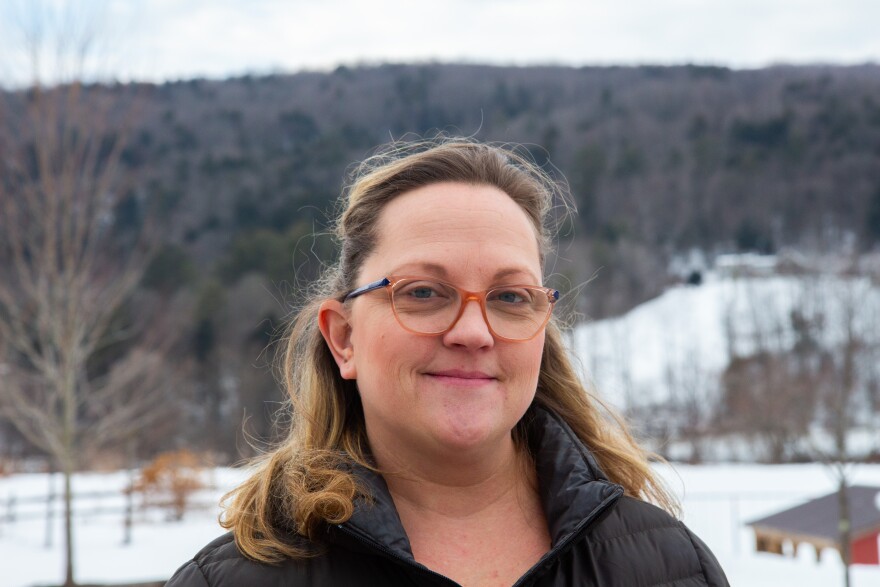On the outside, Middlesex Town Hall looks like the postcard version of Vermont.
The siding is whitewashed and lined with dark green shutters. At its front is a tower — an echo of the church that burned down here before the town hall was built in the early 1900s.
It’s two stories tall. Voting during statewide and presidential elections happens on the top floor.
And the problem, at the moment, is getting up there.

"So, it’s dreadful," says Middlesex Town Clerk Sarah Merriman.
She’s often responsible for helping people in and out of the town hall’s lift. At over two decades old, she says it’s in its final days.
It has heavy doors and is hard to operate — and sometimes, even gets stuck.
"I was in the lift trying to help a grandmother with this baby stroller and I got stuck in an August primary, on a day when it was sweltering," Merriman says. "And, you know, that's not good. Dangerous."
She says the building cannot remain this way.
"We have an inaccessible town hall, as far as anyone is concerned," Merriman says.

Middlesex is not alone. While state and federal law require polling places to be accessible to voters with disabilities, that’s not always the reality in what are often historic buildings.
An ongoing analysis of Vermont’s 266 polling places shows that many have accessibility issues, particularly with parking and thresholds into buildings.
Those polling place surveys are being done by Disability Rights Vermont. The nonprofit agency receives money from Congress to ensure people with disabilities have equal access to the voting process.
"When places are not accessible, and don't put in all of that effort and the legwork ahead of time to just be accessible to everybody, I think it creates — it sets everybody up for a less than successful interaction or experience," says Lindsey Owen, the executive director of Disability Rights Vermont.
She adds that when the pressure falls on individuals with disabilities to ask for accommodations at polling places, because of the stigma attached to disability, this can become a barrier to voting.

National studies from Rutgers University show voters with disabilities turn out at lower rates than voters without disabilities. In 2020 and 2022, the studies found, more than 10% of voters with disabilities experienced difficulty with casting their ballot.
"Everyone can be well-intentioned, but people will also feel uncomfortable. Uncomfortable that either their space isn't accessible or the person feels like, 'Oh, I need extra attention, or I need extra support,'" Owen says. "And so I think on both sides, people are feeling a little bit of shame."
It's worth pointing out that accessibility is not just physical. That's according to Max Barrows, the outreach director for Green Mountain Self-Advocates. The nonprofit advocates for disability rights, and is made up of members with intellectual disabilities.
"We need more than ramps into buildings to include all voters," Barrows says. "Towns could also get better at using plain language when they write the ballots. The ballot measures are not easy to understand the way they are written sometime — it is tricky to know which way you're voting."
And legally, the onus is on the government to make voting accessible — to everyone.
"So to the extent that towns can really initiate that and say, 'We want you here,' like, 'We want you to feel like you belong, and we really want to hear your voice,' I think that will go a long way to people coming forward and asking for those accommodations and participating," Owen says.

There’s a lot of potential participation at stake. In Vermont, one in four people have a disability, according to the Centers for Disease Control and Prevention.
"People need to understand that, you know, when we vote, we're also contributing to the world," Barrows says. "And I think that just as a, you know, all around message is just like, when it comes to voting, you know, we want we want what you got."
Fortunately, Owen says a good number of election officials are interested in increasing the participation of voters with disabilities.
"We are a law firm, and so sometimes people are a little bit wary of engaging with us and having us do a survey of their polling place," she says. "But through those trainings and education around the [Americans with Disabilities Act], there were many town clerks in the state that were like, 'Please come, come see my office, like, tell us what we need to improve upon.'"

Like in Middlesex. Town Clerk Merriman welcomed the survey that Disability Rights Vermont completed in 2022. It pointed out the issues with the elevator lift, among others.
"It added some oomph to what I had been saying to the select board, which is like, 'You know, our lift is about to die, and this place is inaccessible,'" Merriman says.
She adds that while money is usually the obstacle to making accessibility improvements, having a disability rights law firm tell you your space is not compliant with accessibility law is, well, helpful.
"When that report came out, and that survey came out, we distributed it to the board," Merriman says. "I think they thought — well, probably they thought, 'Uh-oh, we're gonna get sued.' You know, it's a, it was a motivator."
On Town Meeting Day, Middlesex voters will decide whether to fund a $65,000 design phase for town hall renovations. It would include better accessibility — and replacing the dreadful lift.
That town meeting will take place at 4:30 p.m. Tuesday at Rumney Memorial School — a more accessible alternative to the town hall.
And at town meetings across the state, Max Barrows with Green Mountain Self-Advocates reminds voters with disabilities that they don’t have to sign up to vote ahead of time, they can bring someone to help read or fill out a ballot, and they don’t need to fill out every question on that ballot.
Have questions, comments or tips? Send us a message.




